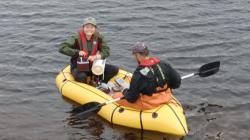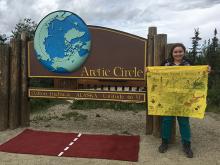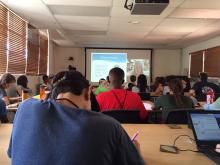Update
Now Archived! PolarConnect event with DJ Kast and research team from Toolik Field Station on Thursday, 7 July 2016. You can access this and other events by visiting the PolarConnect Archives. https://www.polartrec.com/polar-connect/archive
What Are They Doing?

Where Are They?

Latest Journals

George W. Kling is a professor in the Department of Ecology and Evolutionary Biology at the University of Michigan. He primarily studies aquatic ecology and biogeochemistry, and his research has focused on carbon and nutrient cycling, on using stable isotopes to understand trophic interactions, and on the integration of lakes and streams in a landscape context. His recent research has examined the role of microbial diversity in ecosystem function. He has worked internationally on arctic lakes and streams for approximately 25 years, and on tropical lakes in Africa.
Kling's scientific outreach to the public through interviews about his research on climate change and on the killer lakes of Cameroon includes articles in magazines and newspapers (e.g., National Geographic, Smithsonian), T.V. and radio broadcasts (e.g., CNN, BBC), and television films (e.g., BBC, Discovery). He has met regularly with U.S. Congress members to discuss issues of climate change and scientific integrity, and was lead author of the Union of Concerned Scientists – Ecological Society of America publication 'Confronting Climate Change in the Great Lakes Region' (2003). Kling is an associate editor for Limnology and Oceanography (2001-), an elected Fellow of the American Association for the Advancement of Science (1997-), and received a National Academy of Science Young Investigator Award (1993), a NSF Presidential Faculty Fellowship (1995), the United Nations Sasakawa Award (Certificate for Disaster Reduction, 2001), and the ASLO Ruth Patrick Award (2007).

Dr. Byron Crump has worked in the Arctic for over a decade exploring the biodiversity and ecology of bacteria and other microbes in lakes, streams and soils. Microbial communities are essential components of every ecosystem on the planet, and in recent years we have learned that the most abundant organisms in natural microbial communities are unrelated to the cultured organisms studied in the lab for the last 100 years. Microbial communities contain an extremely deep diversity and an immense genomic potential of novel functional genes. Dr. Crump is currently conducting a multi-year study of microbial community composition and growth rate in arctic lakes and streams on the North Slope of Alaska to measure how diversity and growth vary over time and are affected by global change. You can read more about Dr. Crump's research here.





